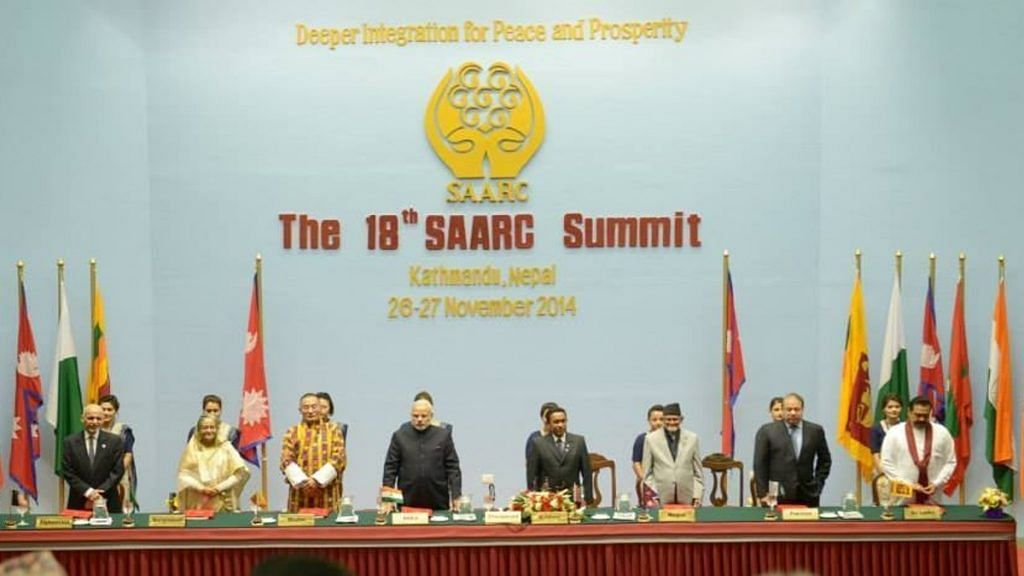New Delhi: Attempts led by India to try and breathe life into the South Asian Association for Regional Cooperation (SAARC) have suffered a setback, and the eight-nation grouping could remain in limbo for longer over the question of accepting the Taliban rulers of Afghanistan, officials and analysts have said.
SAARC is a regional grouping with eight members — India, Pakistan, Bhutan, Bangladesh, Afghanistan, Sri Lanka, the Maldives, and Nepal.
Last Wednesday, Nepal, the present SAARC chair, announced that an informal meeting of the grouping’s foreign ministers, which was scheduled to be held in New York on 25 September, on the sidelines of the United Nations (UN) General Assembly, stood cancelled.
According to an official source, the meeting got cancelled because Pakistan wanted a representative of the Taliban regime — which seized power in Afghanistan last month, with Pakistan’s blessing — to participate. Other members wanted to go ahead without representation from Afghanistan, which joined SAARC in 2007, the source said.
The last SAARC Summit was held in November 2014. The subsequent summit, scheduled to be held in 2016 in Islamabad, was cancelled in light of tensions between India and Pakistan over the Uri attack. Before it was called off, Bhutan, Bangladesh and the erstwhile Afghanistan government had also opted out of the summit while holding Pakistan responsible for vitiating the region’s atmosphere.
However, amid concerns in New Delhi over China’s growing outreach in the region, India has appeared to be trying to get the SAARC process back on track. PM Narendra Modi’s virtual meeting with SAARC leaders (attended by all the countries’ leaders except Pakistan PM Imran Khan) last March to forge regional cooperation in the battle against Covid was seen as a step in this direction.
The resurgence of the Taliban, and Pakistan’s backing for their presence at SAARC, brings a fresh challenge to such attempts.
A second source said all eyes are now on the United Nations (UN), as its approach towards the Taliban may have a larger impact on how the international community deals with the war-torn Afghanistan.
The new administration in Kabul has not yet been able to garner official recognition from either the UN or any country. The Taliban have formally approached the UN to recognise their regime, and appointed their Doha-based spokesperson Suhail Shaheen to be their envoy to the multilateral body.
When the Taliban were in power from 1996-2001, their rule was recognised by just three nations: Pakistan, Saudi Arabia and the United Arab Emirates (UAE). Even at that time, due to the Taliban’s close links with Pakistan’s ISI, India chose not to engage directly with the insurgent group.
While experts cite the China factor to emphasise the continued importance of SAARC, it remains to be seen whether India will be moved by global recognition — even the UN’s — to establish an equation with the Taliban, which puts a big question mark on the regional grouping’s fate.
Also Read: Covid shows if India can’t take care of SAARC, China will
‘SAARC is badly needed for South Asia’
Experts say SAARC continues to be hugely relevant owing to China’s increasing influence in the region.
“South Asia needs SAARC and it needs it badly. But SAARC will remain on the ventilator for a long time to come… Tensions between India and Pakistan, the Afghan question and the growing influence of China in the region are the main reasons why SAARC remains stalled,” said former diplomat Rajiv Bhatia, now a distinguished fellow at the think tank Gateway House.
“The appetite to move ahead in SAARC is quite low among India, Pakistan and Afghanistan, while others such as Nepal and Sri Lanka are now also giving priority to their China relationship,” Bhatia added.
Owing to the stalemate in SAARC, China is now making rapid inroads into the region by establishing its own groupings.
“A China-South Asian Poverty Alleviation Centre has been established in Chongqing. India, Bhutan and Maldives are not party to this initiative but Nepal, Bangladesh, Sri Lanka together with Pakistan and Afghanistan are full participants,” said Ranjit Rae, former Indian ambassador to Nepal and author of Kathmandu Dilemma: Resetting India-Nepal Ties.
“If regional cooperation under SAARC remains stymied, we will find our neighbours gravitating towards China-led initiatives,” he continued.
Rae added that SAARC should play “an important role for achieving our goal of an economically interconnected and interdependent region”.
“A moribund SAARC has provided China an opportunity to create its own regional cooperation mechanism with a sub-group of SAARC members,” he explained.
Sharat Sabharwal, former Indian High Commissioner to Pakistan, told ThePrint that it is due to Pakistan that SAARC was not moving ahead in the past. Pakistan, he noted, had blocked three key regional connectivity agreements back in 2014.
“The ball is now in the UN’s court. It is basically the UN that should recognise the Taliban, and that might allow SAARC to take the decision on the Afghan question. If not SAARC, we will definitely need some kind of regional cooperation. But all these can be done when relationships improve,” he said.
As the SAARC process came to a halt in 2016, India started focussing more on the Bay of Bengal Initiative for Multi-Sectoral Technical and Economic Cooperation (BIMSTEC) — a grouping that counts Bangladesh, Bhutan, India, Nepal, Sri Lanka, Myanmar and Thailand as members, in an effort to bypass Pakistan.
On the question of BIMSTEC, Bhatia said the onus of moving that arrangement lies on Sri Lanka, which is currently the chair, and it should hold a summit-level meeting soon.
(Edited by Sunanda Ranjan)
Also Read: ‘What about my future?’ — Afghan students on Indian grant caught between Taliban & visa rules
